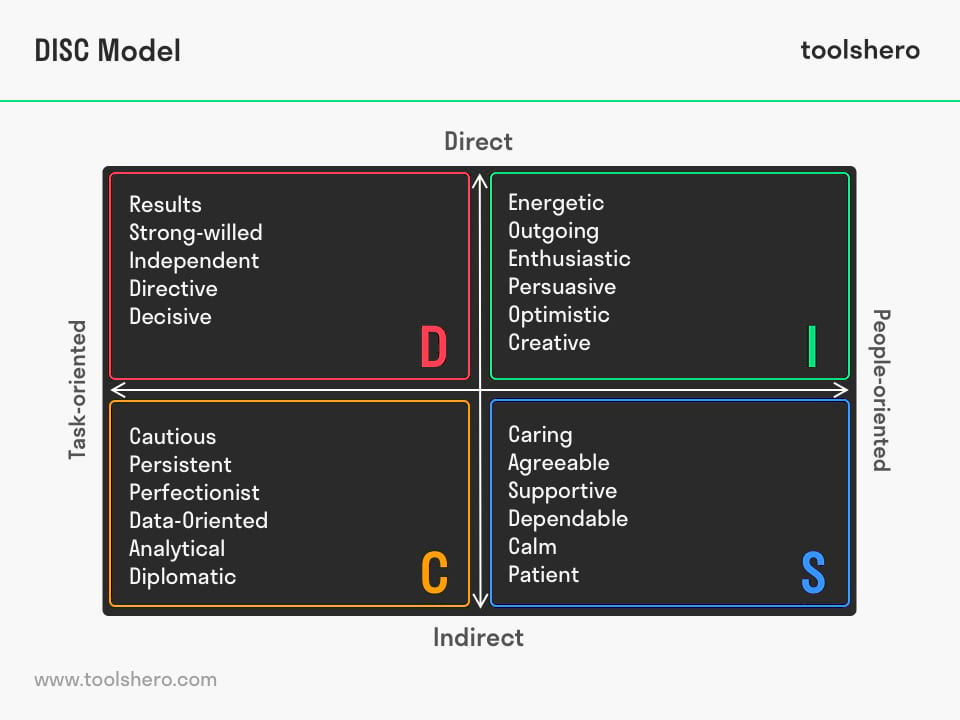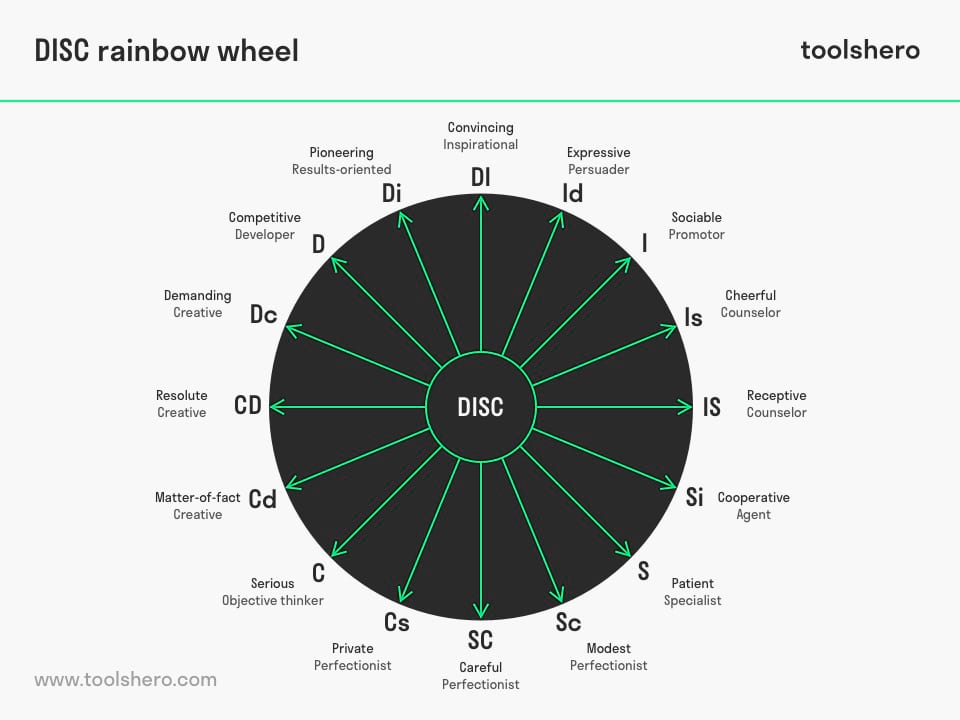DISC Personality Test explained and questionnaire

DISC Personality Test: this article explains the DISC Personality Test by William Moulton Marston in a practical way. The article starts with a general definition and explanation of the DISC test, followed by an explanation of the different personality types and the application of this method. This article also contains the DISC test questionnaire which you can download, fill in and find out your own personality style. Enjoy reading!
What is the DISC Personality Test?
Why do some people dislike change and why do others welcome it in their lives? Why do some people lead and why do other people follow rather than lead? These are just some questions that can be answered by using the DISC Personality Test.
The DISC Personality Test is a personality profile test. This behavioural test was developed by the psychologist William Moulton Marston.
By using the DISC Personality Test people will get a thorough understanding of their own personality and that of other people. The DISC Personality Test was independently studied by different universities and was found to have a reliability of 90%.
DISC Personality Test: DISC factors
The letters represent four personality styles that are also referred to as temperaments: Dominance, Influence, Steadiness and Conscientiousness. The DISC Personality Test provides insights into behaviour and the differences between individuals.
It also highlights how their needs influence their behaviour. Each person favours one temperament but different personality styles are possible too. The DISC personality test arranges the types as two pairs of opposites. On the one hand we have Direct versus Indirect and on the other hand we have Task Oriented versus People Oriented.

Figure 1 – The DISC personality test model
Direct – Indirect
A three step-process will identify someone’s temperament. Step 1 establishes whether someone is direct or indirect. People are direct when they initiate conversation, talk loudly and clearly, take initiative, are agile and restless and are clearly present.
Indirect people are thoughtful, wait until someone else takes the initiative, are soft spoken, move quietly and have a low profile.
Task-oriented – People- oriented
Step 2 assesses whether someone is task-oriented or people-oriented. Task-oriented behaviour is characterized by focusing on tasks and processes. A task-oriented person requires knowledge, facts and reasons and likes to engage in discussions. They take decisions based on facts.
People-oriented behaviour on the other hand is characterized by the fact that someone wants to have good contact with other people and that this person is harmonious and avoids discussions or conflicts. They make decisions based on emotions.
Step three combines the results of step 1 and 2. This produces one of the DISC profiles, or DISC types.
The Complete DISC Personality Masterclass – You & Them
DISC Personality Test: Dominant Type
This is characterized by assertive behaviour, result-mindedness, speaking loudly, taking risks and an air of impatience.
Someone who scores high in dominance and is identified as a “D” personality type is further characterized by directness, assertiveness, independence, and decisiveness. These individuals thrive on challenges and ambitious goals, preferring action over analysis when completing tasks.
D-types are intense competitors who take their opinions and questions seriously. They are comfortable with conflict and push harder than other more passive personality styles to assert their will and take control of a situation, which can help others in their personal growth.
Temperament in this DISC Personality type
A D-personality speaks confidently and quickly ends a conversation if it’s not going anywhere. Their ideas are high-level, outspoken, and sometimes direct, making it easy to understand where they stand on an issue. They may come across as rude unintentionally. They like to take the lead without fully assessing the situation, displaying their assertive attitude.
However, they are open to external perspectives if they believe it will help them achieve the goal faster.
Communication Style
Dominant D-personalities communicate efficiently and in a business-like manner. They see the world in broad terms and often skip details, demanding results. Small talk is seen as a waste of time because D-types want to steer the conversation toward action-oriented steps.
Recognizing a dominant person:
- Emphasizes achieving results and dismisses discussions about methods or strategies
- Tends to figure things out by doing and places less priority on strategy and logic
- Makes decisions based on objectivity rather than emotion
- Moves at a fast pace and enjoys physical activities
DISC Personality Test: Interactive Type
This means that someone is enthusiastic, positive and optimistic. They are in for new ideas and are sensitive to trends. They are high-paced workers and have an intense way of talking. They involve their emotions in decision-making.
Someone who scores high in interactiveness and is identified as an “I” personality type is often expressive, social, enthusiastic, and optimistic.
They love human interaction and thrive in group environments. I-types are energetic and often have an infectious enthusiasm that inspires others. They are talkative and enjoy exchanging ideas, telling stories, and entertaining others.
Temperament in this DISC Personality type
An I-personality speaks with confidence and may have difficulty ending a conversation because they enjoy the social aspect of interactions.
They like to be the center of attention and may sometimes be inclined to exaggerate their stories and experiences to entertain others. I-types are optimistic and often see the best in people and situations.
Communication Style
Interactive I-personalities communicate in a lively and enthusiastic manner. They enjoy conversations based on emotions and personal experiences. They are often enthusiastic storytellers and use vivid language to convey their point. I-types enjoy listening to others and have a supportive and encouraging communication style.
Recognizing an I-personality
- Tends to be talkative and expressive, with enthusiasm in their voice
- Brings forth stories and personal experiences during conversations
- Sees the positive side of people and situations, and encourages others
- Enjoys social contact and often has a vibrant and energetic demeanor
DISC Personality Test: Stable Type
This person is a listener, has a friendly appearance, is polite, service-minded and modest. They are loyal and will postpone their decisions.
Someone who scores high in steadiness and is identified as an “S” personality type is generally calm, patient, reliable, and loyal. They function best in stable and harmonious environments and strive for a sense of inner peace and balance. S-types tend to exhibit consistent and predictable behaviors, and others can rely on them for support and stability.
Temperament in this DISC Personality type
An S-personality will typically speak calmly and patiently, with a gentle tone. They avoid conflicts and seek peaceful resolutions. S-types have an inherent need for stability and feel most comfortable in structured situations. They take time to carefully consider before taking action and value consistency.
Communication Style
Steady S-personalities communicate in a friendly and understanding manner. They actively listen to others and show empathy and patience. S-types prefer harmony in relationships and avoid confrontations. They often use gentle and reassuring language to put others at ease and prioritize the needs of others over their own.
Recognizing an S-type
- Speaks in a calm and gentle tone, with patience and understanding
- Avoids conflicts and strives for harmony in relationships
- Shows empathy and actively listens to others. Prefers structured situations and values consistency
DISC Personality Test: Conscientious Type
This means that someone is factual, somewhat distant and formal, needs extensive information and is non-expressive at times. They want guarantees and make decisions based on facts and results. They are often analytical thinkers.
Someone who scores high in conscientiousness and is identified as a “C” personality type is typically diligent, disciplined, organized, and analytical. They thrive in structured environments and place a high value on precision and accuracy. C-types strive for excellence and are inclined to follow rules and procedures to achieve success. They are often driven and dedicated in their pursuit of quality.
Temperament in this DISC Personality type
A C-personality will typically speak calmly and thoughtfully, with a focus on details and facts. They tend to be thorough in their communication and may ask questions to gain a complete understanding. C-types have a strong need for structure and can become frustrated if things don’t go according to plan. They are often patient and adept at handling complexity.
Communication Style
Conscientious C-personalities communicate in a detailed and precise manner. They are focused on facts and logic and often avoid emotional arguments. C-types prefer structured conversations and can patiently explain how things work. They have a keen eye for errors and strive for precision in their communication.
Recognizing a conscientious personality style:
- Speaks in a calm and thoughtful manner, with attention to details and facts
- Enjoys structure and has a strong need for precision and accuracy
- Often avoids emotional arguments and focuses on factual information
- Patient and skilled at explaining complex subjects

Figure 2 – The DISC Rainbow wheel map
Application of the DISC Personality Test
This behavioural test can be used for various reasons: from personal development and leadership training to recruitment & selection and profile reports.
Using the knowledge obtained from the DISC personality test, people will have a better understanding of their own actions, that of their colleagues and customers, as a result of which people will understand one another better.
They will meet each other’s personal needs more, so that conflicts can be avoided or reduced. This provides a basis for trust and effective cooperation.
DISC Personality test questionnaire
Now that you have read the theory about the DISC test, you can get started with the questionnaire. Download the attachment below (.docx file), complete the questionnaire and calculate your score!
Download the DISC Personality test questionnaire
This template is exclusively for our paying Toolshero members. Click here to see if a membership is something for you!It’s Your Turn
What do you think? Is the DISC Personality Test still applicable in today’s modern companies? Have you ever made a personal DISC personality test? And if so, how did you use it and what were the general results? Did you use it to improve communication? Are there still four personality styles or are there new ones?
Share your experience and knowledge in the comments box below.
More information
- Slowikowski, M. K. (2005). Using the DISC behavioral instrument to guide leadership and communication. AORN journal, 82(5), 835-843.
- De Jonge, J., & Dormann, C. (2003). The DISC model: Demand-induced strain compensation mechanisms in job stress. Occupational stress in the service professions, 43-74.
- Devito, S. (2022). The Complete DISC Personality Masterclass – You and Them. Retrieved 02/26/2024 from Udemy.
- Merloni, A., Fabian, A. C., & Ross, R. R. (2000). On the interpretation of the multicolour disc model for black hole candidates. Monthly Notices of the Royal Astronomical Society, 313(1), 193-197.
- Marston, W. M. (2013). Emotions of Normal People. Cooper Press.
How to cite this article:
Mulder, P. (2016). DISC Personality Test. Retrieved [insert date] from Toolshero: https://www.toolshero.com/psychology/disc-personality-test/
Original publication date: 03/22/2016 | Last update: 02/26/2024
Add a link to this page on your website:
<a href=”https://www.toolshero.com/psychology/disc-personality-test/”>Toolshero: DISC Personality Test</a>












